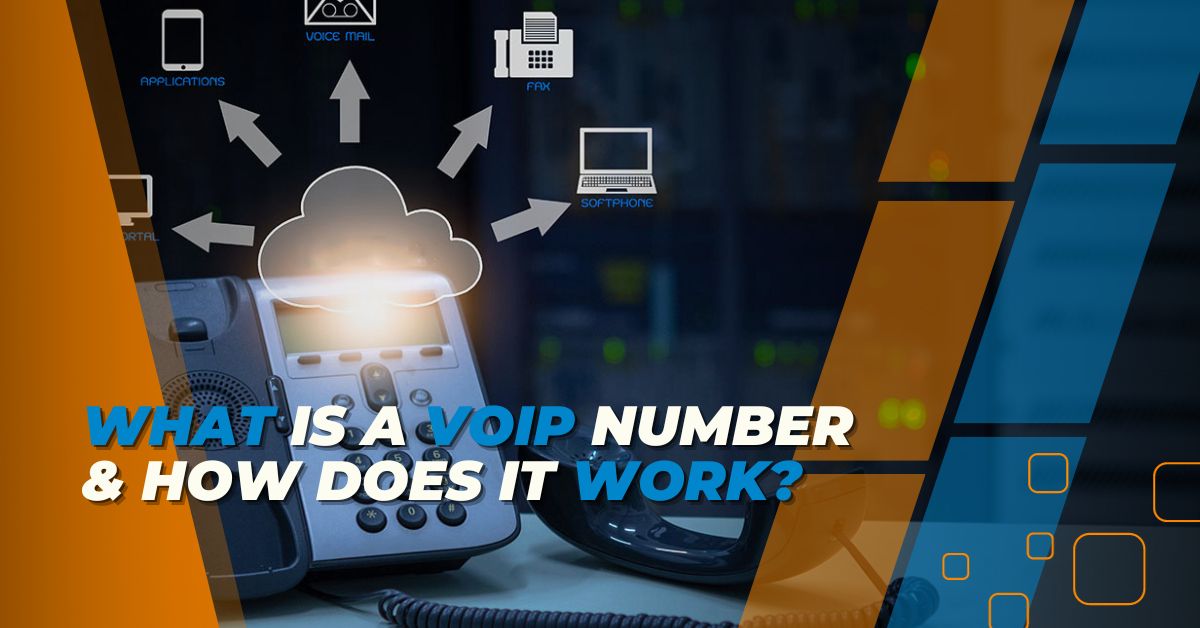In today’s digital age, communication has transcended traditional boundaries, and Voice over Internet Protocol (VoIP) stands at the forefront of this evolution. Gartner predicts that by 2025, the majority of organizations, around 85%, will adopt a primary focus on utilizing cloud technologies. They emphasize that achieving their digital strategies to the fullest extent will be dependent on the integration of cloud-native architectures and technologies.
VoIP has revolutionized how we connect, and at the heart of this innovation lies the VoIP number—a fundamental component of this transformative technology. But what exactly is a VoIP number, and how does it function within the realm of VoIP systems? Anyone looking for efficient and cost-effective communication options must first understand the concept and inner workings of a virtual phone number.
This article will explore the intricacies of VoIP numbers, exploring their definition, functionality, and the advantages they bring to the world of modern communication. Join us as we unravel the intricacies of virtual phone numbers and shed light on their role in shaping the way we connect and converse.
Understanding VoIP
VOIP technology has revolutionized the way we make phone calls, offering a host of benefits and features that traditional phone lines can’t match. Let’s dive into the fundamental aspects of VoIP and how it differs from conventional phone systems.
What Is VoIP?
VoIP, short for Voice over Internet Protocol, is a technology that enables voice communication and multimedia sessions over the Internet. It leverages IP networks to transmit voice data as digital packets, allowing users to make calls through internet-connected devices.
This innovative approach transforms analog audio signals into digital data, opening the door to efficient, cost-effective, and feature-rich communication solutions.
How Does VoIP Differ From Traditional Phone Lines?
Understanding how VoIP differs from conventional phone lines is a prerequisite to fully grasping the technology.
While both serve the purpose of voice communication, they employ vastly different technologies and infrastructure. VoIP capitalizes on the power of the internet, whereas traditional phone systems rely on dedicated copper wires and circuit-switched networks.
How VoIP Numbers Function
VoIP numbers, also known as voice-over IP phone numbers, serve as the linchpin of VoIP communication systems. This section will explore the mechanics behind virtual phone numbers and their role in modern digital communication.

What Is VoIP Number?
A VoIP number, also known as a virtual phone number, is a unique numerical identifier assigned to a user or device within a VoIP system. Unlike traditional phone numbers tied to specific geographic locations, virtual phone numbers are versatile and can be associated with internet-connected devices worldwide.
This flexibility allows users to make and receive calls using VoIP technology, enjoying a range of benefits not offered by conventional telephone lines.
How Are VoIP Numbers Assigned?
The process of assigning virtual phone numbers involves VoIP service providers, who act as the bridge between users and the VoIP network. virtual phone numbers can be acquired through these providers, often with a selection of local, toll-free, or international options.
These numbers are then linked to the user’s account, enabling them to access VoIP calling services and enjoy the advantages of a digitized communication system.
Advantages of VoIP Numbers
Virtual phone numbers are at the forefront of modern communication solutions, delivering a multitude of advantages for both individuals and businesses. Here are some of the remarkable benefits that come with choosing virtual phone numbers over traditional phone systems
Cost-Efficiency
One of the key advantages of utilizing virtual phone numbers lies in their cost-effectiveness. Compared to traditional phone systems, VoIP number pricing often includes lower calling rates, particularly for international calls. Additionally, intra-network calls are frequently free, translating to significant savings for both individuals and enterprises.
Flexibility and Mobility
Virtual phone numbers exemplify communication flexibility. Users are not bound by a fixed physical location, enabling them to make and receive calls from any internet-connected device. This mobility is a game-changer, especially for businesses with remote or on-the-go employees, offering seamless communication regardless of their whereabouts.
Advanced Features
Virtual phone numbers come with a rich set of advanced features, enhancing overall communication experiences. These features can include call forwarding, voicemail-to-email, auto-attendants, and more.
Setting up a VoIP Number
VoIP presents a versatile and cost-effective solution for modern telephony, but successful implementation requires a structured approach.

Selecting a VoIP Service Provider
The first step in establishing a virtual phone number is selecting the right VoIP number providers. Compare options, considering factors like calling plans, international rates, customer support, and user reviews. Make an informed choice to ensure a VoIP provider that aligns with your communication needs.
Hardware and Software Requirements
VoIP technology demands specific devices like IP phones or analog telephone adapters (ATAs). Moreover, robust internet connectivity and compatible devices, such as smartphones or computers, are also integral for a seamless VoIP experience.
Making Calls With VoIP Numbers
Calling using virtual phone numbers is a simple operation that provides significant benefits over traditional phone systems. This section will dive into the process of making calls using VoIP
The Dialing Process
Users can simply input the desired number using a VoIP number app or compatible device, and the call is routed through the internet. VoIP numbers provide greater flexibility than traditional phones, as they allow for calls to be made from any internet-enabled device, regardless of geographic location.
Call Quality and Reliability
Virtual phone numbers have come a long way in terms of call quality and reliability. Virtual phone number providers now offer HD-quality calls, ensuring crystal-clear conversations. The technology’s reliability is on par with traditional phone services, with minimal downtime.
VoIP Number Security
Although VoIP technology offers numerous benefits, it’s best to be vigilant about safeguarding your communication. Here are some steps you can take to protect your virtual phone number from potential fraud and maintain privacy measures

Protecting Your VoIP Number From Fraud
Virtual phone number providers offer various security features to prevent unauthorized access and misuse of your number. Implement strong authentication methods and monitoring to prevent unauthorized access. Vigilance and regular audits are key to detecting and mitigating any fraudulent activities promptly.
Encryption and Privacy Measures
VoIP vs traditional phone services offer advanced encryption protocols that shield your calls and messages from eavesdropping. Virtual phone number providers prioritize data protection, ensuring that your communications remain confidential and secure from potential eavesdroppers or cyber threats.
VoIP Numbers in Business
Virtual phone numbers are transforming the way businesses communicate. With advanced features and flexibility, they offer a range of benefits for enterprises looking to enhance their communication strategies.
Enhancing Communication in the Workplace
Incorporating virtual phone numbers into your business operations greatly enhances workplace communication. With features like call forwarding and voicemail-to-email, teams can stay connected seamlessly, fostering collaboration and productivity.
Cost Savings for Businesses
One of the significant advantages of VoIP numbers for businesses is cost savings. Compared to traditional phone services, VoIP offers economical calling options.
Businesses can anticipate varying savings when transitioning to a VoIP system, typically falling within the range of 30% to 50%. The actual amount saved depends on factors such as the company’s size and its previous communication system. Leveraging the best VoIP number service can optimize communication expenses while enhancing operational efficiency and flexibility.
Challenges and Concerns
Despite the numerous VoIP number benefits, there are also some challenges and concerns that users should be aware of. These aspects, such as emergency calling limitations and reliance on internet connectivity, need to be promptly addressed for a seamless experience.

Emergency Calling Limitations
One notable concern with VoIP services is the limitations it poses on emergency calling. Unlike traditional phones, VoIP may not always provide accurate location information when dialing emergency services. Understand these limitations and take necessary precautions, such as registering your physical address.
Reliance on Internet Connectivity
VoIP’s reliance on internet connectivity can be a potential challenge. Interruptions in the internet connection can disrupt calls and affect communication. Porting VoIP numbers doesn’t eliminate this challenge, so it’s essential to have a reliable internet connection to ensure seamless VoIP services.
Future of VoIP Numbers
The future of virtual phone numbers holds exciting possibilities driven by technological advancements and integration with other communication tools. As businesses increasingly embrace cloud-based phone systems, the use of VoIP phone numbers is expected to significantly impact modern methods of communication.

Technological Advancements
Virtual phone numbers are evolving with cutting-edge technological advancements. These innovations enhance call quality, reliability, and security. With the growth of the cloud-based phone system, virtual phone numbers are poised to offer even more advanced features, benefiting both businesses and individuals.
Integration With Other Communication Tools
The integration of VoIP numbers with various communication tools is on the horizon. Businesses can look forward to a more streamlined approach to managing their communication needs, thanks to the seamless integration of cloud phone systems with other essential telecommunication services.
Bottom Line
VoIP numbers have revolutionized the way we communicate, offering a flexible and versatile solution for both individuals and businesses. Understanding what it is and how to set up VoIP number is vital in navigating the world of modern telephony. As we’ve explored various aspects, from making calls with virtual phone numbers to enhancing communication in the workplace, it’s clear that these cloud-based phone systems are a game-changer.
For businesses in Melbourne, VIC, seeking reliable solutions for SAP B1 automation, private cloud, and 3CX communication, VoIPElements stands out as a trusted provider. Their expertise ensures seamless setup and management of VoIP numbers, making it easier than ever to harness the benefits of this innovative technology.
FAQs
Q. Can I keep my existing phone number when switching to VoIP?
- Yes, you can often keep your current phone number by porting it to your VoIP service provider.
Q. Is VoIP suitable for international calls?
- VoIP is excellent for international calls; it often offers lower rates compared to traditional phone services.
Q. Are there any legal regulations for VoIP usage?
- VoIP services are subject to regulations, which can vary by country. Consult your local authorities for specific guidelines.
Q. How do I troubleshoot common VoIP call quality issues?
- To resolve call quality problems, check your internet connection, ensure adequate bandwidth, and consider using Quality of Service (QoS) settings on your router.


